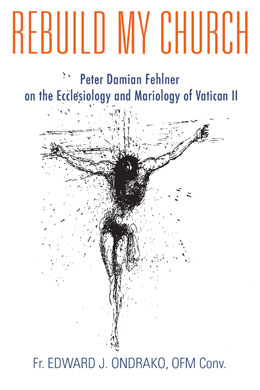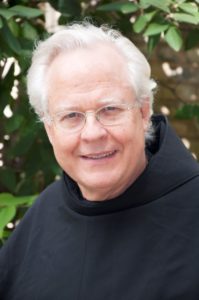Franciscan Feast of Our Lady of the Angels of Portiuncula, Assisi – August 2
Sir 24, 1-4, 16, 22-24; Gal 4:3-7; Lk 1, 26-33.
Theme: “God has sent the Spirit of his Son, into our hearts (Gal 4: 6);
Subtheme: Wisdom praises herself, and tells of her glory in the midst of her people (Sir 24: 1)
 Rebuild My Church:[1] Inspiration, Content and Religious Liberty in the USA
Rebuild My Church:[1] Inspiration, Content and Religious Liberty in the USA
“The Lord gave me such faith in churches that I would simply pray and speak in this way: We adore you, Lord Jesus Christ, in all Your churches throughout the world, and we bless You, for through Your holy cross You have redeemed the world” (St. Francis of Assisi, Testament). As a young man discerning what God was asking of him, he took literally a message from Christ to rebuild the Church. He raised funds and rebuilt three Churches including Our Lady of the Angels of Portiuncula which became his favorite place. It was there that he founded the Order of Friars Minor, the Order of Poor Clares, received a papal blessing that visitors for perpetuity could receive the plenary Portiuncula indulgence, and died within fifty yards on the evening of 3 October 1226.
“Wisdom praises herself, and tells of her glory in the midst of her people (Sir 24: 1).“ I am filled with joy to announce the publication of Rebuild My Church on August 2, the feast. RMC summarizes the contributions of an extraordinarily faithful follower of St. Francis’ Rule of 1223 and his Testament. As St. Francis passed over into God in a transport of contemplation, he invites every spiritual person into this passing over and transport of soul.[2] Rebuild My Church is a tribute to Friar Peter Damian Fehlner, O.F.M.Conv. (1931-2018), his life, thought and original insight into the commonalities in the works of St. Bonaventure (d. 1274), Bl. John Duns Scotus (d. 1308) and St. John Henry Newman (d. 1890).[3]
Fr. Fehlner read the six original chapters and said: ”You have represented the development of my entire life’s thought correctly.” In May 2017, I defended these six chapters and my doctoral committee at Notre Dame gave their approval. Advised to put it down for a while, I continued to expand my appreciation for Fr. Fehlner’s thought faithfully in the book now called Rebuild My Church.
Questions from scholars and conversations with Fr. Fehlner’s closest acquaintances were the prompt to expand the prologue and introduction, to include the Protestant Reformation and resulting changes in the cultural atmosphere, not unlike the cultural polarization of the twenty-first century, the continuity of principles from Bonaventure to Duns Scotus, Vatican II, Charles Taylor’s two-band theory of modernity, and the Franciscan Marian principle as all-inclusive. Chapters 1 and 2 narrate Fr. Fehlner’s life with candor and loyalty. Chapter 1 navigates the twilight of modernity; chapter 2, Fr. Fehlner’s middle voice. Chapters 3 and 4 explain his appropriation of Bonaventure. Chapter 4 is on the Trinity and the Franciscan School today. Chapters 5 and 6 clarify key concepts of the influence of Duns Scotus; chapter 6, Duns Scotus’ Marian principle. Chapter 7 narrates the original discovery of the relationship of Duns Scotus to John Henry Newman. Chapter 8 engages modernity with Newman’s Christology and Mariology. Chapter 9 is Fr. Fehlner’s theological response to the event – “Rebuild My Church,” an escape from the Hegelian web, engaging Heidegger and the doubleness of the gift of modernity. Chapter 10 is why Fr. Fehlner matters, why his theology is prophetic, apocalyptic and aesthetic, his retrieval of the all but disabled Scotistic tradition, diagnoses of forgetting that is sanctioned by the Holy Spirit, remembering deeply and broadly, his new “eyes’ on Duns Scotus’ and Newman’s system of truths.
The feast of Our Lady of the Angels of Portiuncula is fitting to publish Rebuild My Church as a companion volume to Theologian of Auschwitz.[4] Eric and Linda Wolf of Lectio Publishing deserve a shout out for recognizing Fr. Fehlner’s genius in explaining with genial clarity why Fr. Kolbe is a Scotist. In his Testament, St. Francis may surprise some who think he was anti-study: “We should honor and respect all theologians and those who minister the most holy divine words as those who minister spirit and life to us” (Jn 6:64).
Sirach is concise: “Wisdom praises herself, and tells of her glory in the midst of her people” (Sir 24). By reading Sirach and St. Francis’ Testament, his faith in churches, faith in priests who live according to the manner of the holy Roman Church, the holy mysteries of the Most Holy Body and Blood which they receive and which they alone minister to others, and theologians who minister the most holy divine words radiate the Franciscan charism in America when religious liberty is under assault, our entire constitutional order of democratic debate is under challenge and “cancel culture” is powerful and increasingly relentless. Compare the malignment of Duns Scotus with problems in a non-faith context. The unforgiveable offenses in modern thinking: “racist, sexist, anti-gay” are indictments even from thought provoking books that are well documented. To critics, they espouse the wrong ideas.[5] Fr. Fehlner teaches how to use Fr. Kolbe’s Scotistic method in critical engagement with modernity.
The Scotus-Newman connection fills ten chapters of Rebuild My Church. The prologue and introduction prepare the reader to avoid the historical indictment that Duns Scotus was espousing the wrong ideas. Some scholars dismiss Scotistic thought as torturous, while Fr. Fehlner’s incorporation of Scotistic method demonstrates why he concluded that there was a connection between the University of Oxford’s theologians, Bl. Duns Scotus and St. John Henry Newman. To critics, it seemed beyond the pale to think that linking them might have a significant bearing on the future of Catholic theology.
I incorporated insights from many who knew Fr. Fehlner and more than fifty years of heart-to-heart conversations. Rebuild My Church is an accurate portrayal of his critical engagement in a faith context with our post-Christian culture. One may compare his faith context to a non-faith context as Ken Starr’s who shines a bright spotlight on the autonomy principle at the heart of religious liberty in America. An extra layer of constitutional protection exists for all faith communities. Both faith and non-faith contexts have long lists of external reasons that contribute to a post-religious and a post-Christian culture. The non-faith contexts compare to the temporization of Church authorities in the face of the secular invasion, inviting ideas into the Church communities without the competence of leaders to guide them Christianly. These engender collective complicity in creating a post-Christian culture.[6]
Religious freedom; freedom of speech; freedom of the press; and freedom of assembly are under steady erosion of our nation’s commitment. Yet, “God has sent the Spirit of his Son, into our hearts; “You are no longer a slave, but a child, and if a child then also an heir, through God.” (Gal 4, 6, 7).
Delivered at The Hammes Notre Dame Bookstore by Fr. Edward J. Ondrako, O.F.M.Conv.
eondrako@alumni.nd.edu
________________________
[1] E. J. Ondrako, Rebuild My Church: Peter Damian Fehlner’s Appropriation and Development of the Ecclesiology and Mariology of Vatican II (Hobe Sound, FL: Lectio Publishing, LLC, 2021). ISBN 978-1-943901-18-0. www.lectiopublishing.com. Contact Eric and Linda Wolf, publishers.
[2] St. Bonaventure, Itinerarium Mentis in Deum; The Journey of the Mind to God, chapter 7, 3.
[3] E. J. Ondrako, The Newman-Scotus Reader (New Bedford, MA; Academy of the Immaculate, 2016, canonization issue, 2019), chapter 7, 239-389. A concise chart comparing Bonaventure, Duns Scotus and Newman is on 244.
[4] P. D. Fehlner, Theologian of Auschwitz (Hobe Sound, FL: Lectio Publishing, LLC, 2020).
[5] Ken Starr, Religious Liberty in Crisis (New York: Encounter Books, 2021), 169-170.
[6] This aphorism from Cyril O’Regan, my mentor at Notre Dame, interlocks his inclusive thought with Fr. Fehlner’s.
Fr. Edward J. Ondrako, OFM Conventual
Research Fellow Pontifical Faculty of St. Bonaventure, Rome
Visiting Scholar, McGrath Institute for Church Life
University of Notre Dame
August 2, 2021
